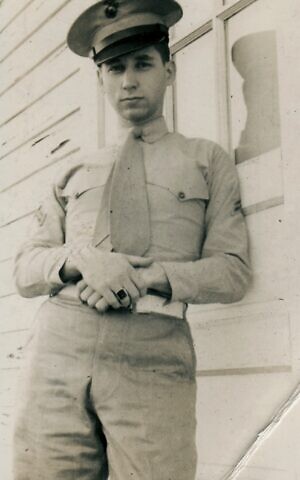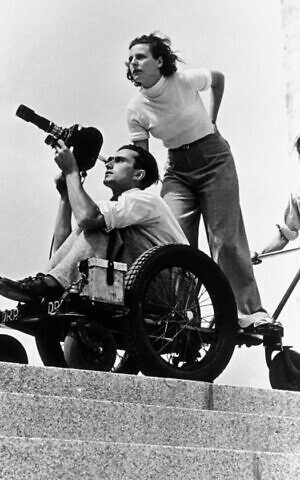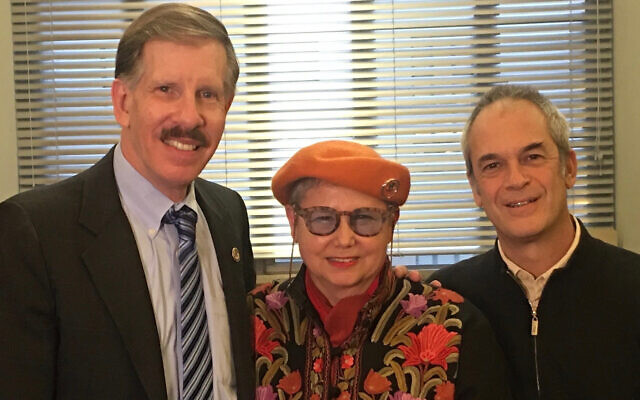On July 13, 1945, Marine Corps Sgt. Stuart Schulberg wrote to his wife Barbara that he was heading from Washington to Germany for a special mission involving 10 major cities and covering all of Bavaria and the south of the country, possibly along with parts of the British and French Zones.
“Sometimes I think the job is a few sizes too big for me. I suppose I have never had so much responsibility. There is so much to do, and so much of it is so important that I grow terrified,” Schulberg wrote.
Indeed, the 23-year-old Schulberg’s mission was daunting — but also critical. He and several others were assigned to the War Crimes Film Unit of the OSS Field Film Photographic Branch commanded by Hollywood film director John Ford, a US Naval Reserve officer. This specialized sub-group was tasked with locating Nazi-made footage showing the evils of National Socialism and the Nazis’ commission of crimes against humanity against Jews and others during the recently-ended war in Europe.
With a picture worth a thousand words, these moving images would be invaluable to the case being built by Associate Supreme Court Justice Robert H. Jackson, chief US prosecutor at the Nuremberg Trials. The trials were to begin in November 1945, and there wasn’t much time to find such film footage, review it, and prepare it for the court proceedings. The greatest challenge was the fact that the Nazis did everything they could to destroy this visual evidence of their atrocities. Schulberg and the others did not know what and how much they would manage to uncover.
The fascinating story of how this special team tracked down incriminating Nazi films and turned them into evidence that has shaped our understanding and visual perception of the Holocaust to this day is told in “Filmmakers for the Prosecution,” a documentary directed by French filmmaker Jean-Christophe Klotz. The film opens in New York on January 27.
Get The Times of Israel's Daily Edition by email and never miss our top stories
“Our collective memory of those times is a construction of the Schulbergs, and the films they made have influenced other films in the decades since,” Klotz said.
Klotz, who spoke to The Times of Israel from Provence, France, referred to the two films shown in the Nuremberg courtroom, “The Nazi Plan” and “Nazi Concentration Camps,” as well as a later documentary about the trials by Stuart Schulberg titled, “Nuremberg: Its Lesson For Today.” Schulberg was engaged by the US military to make the film in November 1946, one month after the verdicts were handed down, and he completed it in the spring of 1948.

Stuart Schulberg (foreground) and Bob Webb in the Nuremberg cutting room, 1945. (Courtesy of Lilo Balto)
“Filmmakers for the Prosecution” combines well-researched archival footage and interviews with a variety of experts, including Eli Rosenbaum, who served for nearly 40 years in the Office of Special Investigations of the US Department of Justice, prosecuting Nazis in the US and extraditing others to face justice in Germany and other European countries. Excerpts from an interview with Niklas Frank, son of Hans Frank, the Nazi-appointed Governor General for occupied Poland, are particularly damning. The elder Frank was found guilty at Nuremberg and hanged on October 16, 1946.
The film is based on a monograph by film producer and activist Sandra Schulberg, Stuart Schulberg’s daughter. The monograph in turn is based on 300 pages of typed letters Stuart sent to his wife Barbara during his hunt for the film footage. Sandra Schulberg had not been aware of these letters, nor of the complete archive from the project her father kept, until after her parents had both died.
“I made some of the letters available to [director] Jean-Christophe [Klotz], but they really deserve a book of their own,” Sandra Schulberg said.
Speaking from Los Angeles, she shared that her father — who went on to have a career as a national television news and documentary producer — had always engaged her about his work, but had never spoken specifically about his involvement in the Nuremberg Trials.

Stuart Schulberg in his US Marine Corps uniform. (Courtesy of Kino Lorber)
It seemed that Stuart Schulberg and his older brother Budd Schulberg, who coincidentally was supervisor of the War Crimes Film Unit, both put the experience behind them as they launched their post-war careers. Budd, who had published a successful novel in 1941, was eager to get back to writing screenplays and books. He won the Oscar for best story and screenplay for “On the Waterfront” in 1954.
A significant portion of “Filmmakers for the Prosecution” is devoted to the making and politically-influenced fate of “Nuremberg: Its Lesson For Today” — the documentary about the trials made by Stuart Schulberg.
After all the work that Stuart Schulberg put into making the film, it played only in Germany from the end of 1948 through 1949.
“By the spring of 1949, the American press was reporting that the US government was sitting on the film, but no government official would take responsibility for the decision to withhold it from American theaters,” Sandra Schulberg said.
“In early 2011, Nuremberg scholar and law professor John Barrett forwarded me a letter he had found, dated November 19, 1948. It was addressed to Justice Jackson and was signed by the then-Secretary of the Army Kenneth Royall. Royall informed Jackson that due to policy changes, ‘Nuremberg’ was not in the interest of the ‘army or the nation’ and would not be released to the general public,” she said.
This suppression was a result of the beginning of the Cold War, which essentially buried what Stuart Schulberg had labored so hard to produce for the benefit of the world.
“The Cold War brought for the most part an end to postwar Allied enthusiasm for prosecuting Nazi war criminals and caused the trials to peter out by 1950… Now West Germany was our ally and our former ally, the Soviet Union, was our enemy — not at all the story portrayed in the film. The film conflicted with that narrative, so a great opportunity was lost to educate Americans,” former US prosecutor Eli Rosenberg says in “Filmmakers for the Prosecution.”
Sandra Schulberg partnered with Josh Waletzky to resurrect and restore her father’s film. It premiered at the Hague in 2009 and was screened in the US beginning in 2010.
A 16-millimeter print of “Nuremberg” went unnoticed in the Schulberg home for decades. The original 35-millimeter negative had been lost or destroyed. Fortunately, good prints of the film were located at Germany’s Federal Archives, and a new negative could be made from one of those.
The soundtrack was reconstructed from scratch using the soundtrack on the print and Stuart Schulberg’s script as guides, as well as original audio recordings from the court proceedings. Actor Liev Schreiber lent his voice to a new recording of the original narration.
Digital versions of the film now exist in 13 languages and have been shown in many countries.

Nazi filmmaker Leni Riefenstahl (standing on dolly) helped identify Nazis on film footage after her capture by Allied forces. (Courtesy of Kino Lorber)
As Schulberg worked on this major undertaking, she relied on her father’s archive to enlighten her about the creation of his documentary.
“There were two people who played a key role in helping me to understand the historical significance of the film, and who were the first to review my father’s papers,” Schulberg said.
“They are Raye Farr, former head of the Steven Spielberg Film and Video Archive at the US Holocaust Memorial Museum, and the late Ronny Loewy, former head of the Cinematography of the Holocaust initiative of the Fritz Bauer Institut,” she said.
Director Klotz said he was struck by the youth of the members of the team who hunted down and worked with the Nazi footage and wondered about how the repeated exposure to such harrowing images affected them.
“It was incredible. Stuart Schulberg was only 23. It must have been the first time in his life that he saw things like this,” Klotz said.
According to Sandra Schulberg, her uncle Budd Schulberg “left Germany in December 1945 and carried a hatred of Germany pretty much for the rest of his life. He was very unforgiving. He would tell me how hard it was for him to understand that Stuart had been able to make real German friends.”
Stuart was most certainly affected by his work for the trials, but the fact that he stayed on in Europe making his documentary and working on behalf of the Marshall Plan gave him a more nuanced view of the situation.

Left to right: Former Director of the United States Department of Justice, Office of Special Investigations Eli Rosenbaum, producer Sandra Schulberg, and director Jean-Christophe Klotz at the US Department of Justice, December 2019. (Courtesy of Kino Lorber)
“We learn from letters that my mother [who had joined my dad in Europe after the trials] wrote to her father that Stuart took his denazification responsibilities very seriously. He got to decide many cases in which a person’s career would be destroyed or resurrected. And he came to appreciate and make distinctions between un-resurrected Nazis and those who tried to resist — if only in their minds and hearts,” Schulberg said.
Accordingly, Stuart and Barbara gathered around themselves Germans who hated Hitler and all he stood for.
Nonetheless, they also shared the little they had with impoverished German strangers who were hungry and freezing in the bitter winter of 1947-1948. After dropping Stuart off at his Berlin office every day, Barbara would drive up and down the Kudamm offering lifts to passersby.
“Stuart seems to have had a determination not to oversimplify, to look for subtlety and nuance, to make allowances for human weakness and above all, to resist judging his fellow men and women,” Schulberg said.
“To this day, I’m grateful for this legacy of compassion that I got from my parents’ example and which was a spoken and unspoken precept in our family,” she said.


